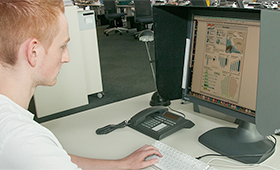Learning to use media in training
BIBB analysis and checklists of media competency
06/2017 | Bonn, 07.03.2017

What media skills do today’s school leavers have? Which competencies do they need after their training in order to be able to use media in an independent and focussed manner — and in a world of work increasingly characterised by networking and digitalisation? The Federal Institute for Vocational Education and Training (BIBB) uses the results of the research project “Using and producing media - development of media competency in vocational education and training” to show that requirements vary significantly in the different occupations and occupational groups. The analysis suggests that— in place of uniform specifications across all occupations — checks should be made in future, as part of restructuring, to determine whether or which aspects of media competency should be incorporated in the relevant training regulations. A checklist provides an overview for this purpose.
For the first time, the BIBB study provides a comprehensive cross-sectional analysis of the importance of media competency across occupational and sector boundaries and also devises a classification of the aspects and dimensions of media competency under the German Qualification Framework (DQR) categories. The BIBB begins by redefining the concept of media competency in a vocational context. Not only technical aspects are included, but also those relating to collaboration, communication, learning, and to the framework conditions when working with media. The complexity of media competency has therefore been more clearly defined and harnessed for VET practice.
The analysis shows that responsible collaboration in the occupation is becoming increasingly important. It is expected, for example, that trainees use media for communication and cooperation, however that they are also mindful of using media in a respectful manner. This also requires use of language appropriate to the situation as well as the evaluation of information. Employees are also being confronted with technical innovations and ever shorter innovation cycles in many areas of professional life. This means trainees must develop the competency in future to recognise innovations in the occupation, to infer what they need to learn from this as well as to actively and independently structure the learning process. It is also expected that legal, ethical and economic fundamentals relating to media use are taken into account. Today, training must also deliver these competencies in order for future skilled workers to be able to act independently and responsibly in increasingly “cyber-physical” controlled systems - i.e. in a networked and digitalised world of work.
Whether media competency should be taken into account and which aspects should be considered can be determined using a checklist which is available for the first time in this form. The study shows, for example, that aspects such as “focussed use of media” are important for all occupations. This includes, in particular, the ability to deal with standard software and also the documenting of work results. Differentiation exists in “design using media” as well as in “openness to innovation” which relate more to media producing occupations, while in media using occupations the handling of specialist software is relevant across a much more narrowly defined area — for example when working with inventory management systems or on control stations for machines and facilities. Examples from existing training regulations show how relevant learning goals might be formulated.
In addition, the study also develops recommendations for media competency training in schools and companies. Schools are not expected to always provide state-of-the-art technology. It is more important that analogue and digital media are used with a practical focus and in meaningful contexts in terms of content. These contexts should address the responsible use of the Internet and social media offers and, in doing so, also highlight the limits and risks of media use. According to BIBB experts, it should not be mandatory that the use of media is delivered in schools in a separately taught subject such as media studies or information technology, but should be integrated within the individual subjects on a task-related basis - as will also be the case later on in company-based practice.
In order to provide business and particularly small and medium-sized companies with greater support and guidance as they enter the digital age and to offer them greater certainty when training their future skilled workers in the use of media, the development of media competency should be supported by means of providing both learning materials and courses for trainees and trainers alike. Government or business institutions, for example chambers, might assume a coordinating role in this by categorising, evaluating and publishing existing documents and course provision.
The results of the BIBB investigation are summarised in the academic research discussion paper (WDP) “Use and production of media – development of media competences in vocational education and training”, issue no. 181. The WDP is available for download at www.bibb.de/wdp (in German only).
Image material is available at www.bibb.de/pressefotos.
Contact partner at the BIBB:
Dr. Heike Krämer; E-Mail: kraemer@bibb.de
Specimen copy requested if printed.